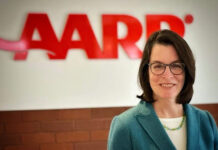From his lofty perch atop the Statehouse, the Independent Man seems like a lonely soul, but he really isn’t.
With spear in hand, the statue overlooks the capital city as a symbol of the spirit of freedom and independence, as the folklore goes, that led 17th-century Puritan minister Roger Williams to start the Colony of Rhode Island after being expelled from Massachusetts.
In Rhode Island politics, it seems, the more times change, the more they stay the same. Today, nearly half of the state’s registered voters are independents, 378,669, or 48.4 percent, outnumbering registered Democrats, 307,963, or 39.4 percent. Registered Republicans are a distant third at 92,021, or 11.7 percent, according to statistics from R.I. Secretary of State Nellie M. Gorbea’s office. And those numbers have remained relatively consistent since 2006, when the state fully implemented its Central Voter Registration System.
The large number of independent voters might be surprising to some in a state dominated for so long by Democrats, but it suggests a splintering or erosion of the two-party system that, despite the growing partisan nature of national politics, is happening among the electorate here and in numerous other states.
“It’s a reflection of people’s declining trust in the [two major] parties,” said John Marion, executive director of Common Cause Rhode Island, a nonprofit that promotes representative democracy. “They don’t see [the Democratic and Republican] parties as an effective tool to represent them.”
[caption id="attachment_230300" align="aligncenter" width="696"]
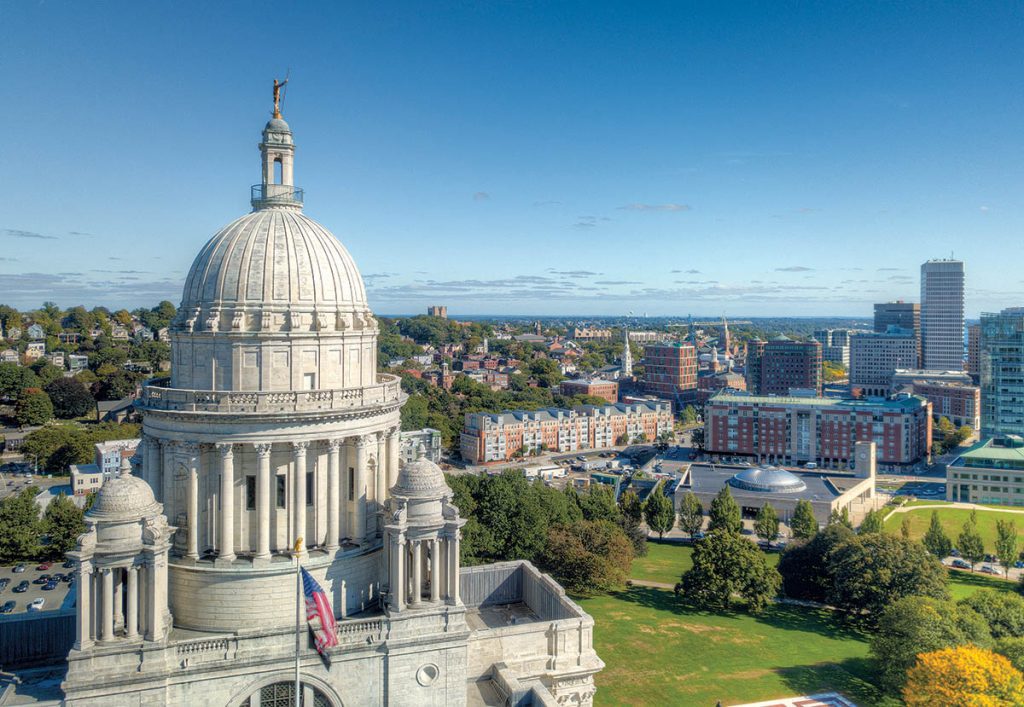
LOFTY PERCH: With spear in hand from high atop the Statehouse, the Independent Man overlooks Providence as a symbol of the spirit of freedom and independence that led 17th-century Puritan minister Roger Williams to start the Colony of Rhode Island after being expelled from Massachusetts. / PBN PHOTO/PAM BHATIA[/caption]
INVISIBLE FORCE?
Yet despite independents’ prominence on the Rhode Island political scene, most of the candidates for statewide office – and most of the eventual winners – continue to be Democrats. Observers attribute that to an entrenched Democratic Party fundraising and support network and a lack of viable challengers to Democrats for many elected seats.
In the General Assembly, 17 of the 38 seats in the Senate are not being contested in the Nov. 6 general election. Of the 75 seats in the House, 39 are not being contested, according to data from Sav Rebecchi, a Jamestown resident who started a website – www.fullballotsRI.com – to encourage more competition for elected offices in Rhode Island. Nearly all of those uncontested seats are held by Democrats.
Of the 21 Senate seats being contested, Republicans are challenging for 18 of those and independents are challenging for three. Among the 36 House seats being contested, Republicans are challenging for 23 and independents for 13.
June Speakman, a political science professor at Roger Williams University in Bristol, said independent candidates are at a disadvantage because most voters use a candidate’s party affiliation listed on ballots as a shortcut to understanding a candidate’s political values. Being listed as an independent is, by comparison, vague.
“Party labels are cues when you don’t know much about someone,” she said. “When you see someone is an independent, it doesn’t tell us anything. It’s a nice word. But what does it mean?”
Could this be the year Rhode Island’s eclectic bunch of independent political candidates taps into the raw power of the state’s largest group of registered voters?
CAN THEY GET ELECTED?
Independent gubernatorial candidate Joseph A. Trillo, formerly a Republican state representative who has owned a string of manufacturing and retail businesses in Rhode Island, was the first independent to make headlines in this year’s election cycle, when his boat – showing a “Trillo for Governor” banner and blasting patriotic music – struck a rock off Charlestown in July and he called for help.
That hasn’t deterred the 75-year-old from his brand of traditional campaigning, using two buses and a truck with his banners to ride around the state, including regular runs up and down Interstate 95 from his campaign office in Warwick. In 2016, he served as then-presidential candidate Donald Trump’s state campaign manager in Rhode Island.
Trillo’s reason for running as an independent is simple: “I don’t think a Republican can get elected as governor [in Rhode Island] anymore.”
He credited former Gov. Lincoln D. Chafee with “kicking in the door” of state politics for independents. Like Trillo, Chafee was a Republican at first but won the election for governor in 2010 running as an independent. During his first term, however, Chafee switched his affiliation to the Democratic Party and didn’t seek a second term. He did launch a short-lived bid for president in 2015 as a Democrat. (Chafee did not return calls seeking comment for this story.)
“I don’t think I’ve changed my positions,” Trillo said about his switch from Republican to independent. He described himself as a moderate on social issues and a conservative on fiscal issues. “A lot of Trump’s positions appeal to me,” he added.
He believes businesses in Rhode Island are overtaxed, but he doesn’t agree with making deals with selected companies for tax breaks and other incentives to create jobs – an approach pursued by Democratic incumbent Gov. Gina M. Raimondo.
Also, Trillo said Rhode Island should “shed its image as a sanctuary state” for undocumented immigrants, criticizing Democratic Providence Mayor Jorge O. Elorza, whose parents emigrated from Guatemala, for wanting to make the state capital a “sanctuary city.”
Being an independent often presents greater challenges raising enough money to mount serious campaigns than for party-affiliated candidates, especially Democrats in Rhode Island. For instance, Trillo reported having nearly $312,000 in campaign coffers as of Oct. 8, a far cry behind Raimondo, who reported having $2.9 million as of Oct. 8. Republican Allan W. Fung, the Cranston mayor, reported having $1.5 million on Oct. 8.
Trillo believes the state’s Republican Party has become “too one-sided.” He explained: “I think people in Rhode Island are very independent. They’re independent-thinking people.
“When you’re running in a party, you have to support every [candidate] in the party,” he added. “I don’t have to support them now that I’m an independent.”
In Rhode Island’s recent elections, independents typically have voted Democrat, Speakman said. “Rhode Island is as close as you can get to a one-party state,” she added.
But Republicans did manage to hold the governor’s seat in Rhode Island for a 16-year stretch beginning in 1996 with Lincoln C. Almond and ending with Donald L. Carcieri in 2011. Both served eight years over two terms and couldn’t have been elected without the help of independents.
And two men – Chafee and the late Robert J. Healey – made major impacts on Rhode Island politics running as independents in recent elections. Chafee was well-known in local political circles, having been the son of the late Republican Gov. John Chafee, who also served as secretary of the U.S. Navy and as a U.S. senator from Rhode Island. Upon John Chafee’s death, Lincoln was appointed to fill his father’s unexpired term in the U.S. Senate in 1999 and was elected the following year to a full six-year term as a Republican.
After losing a re-election bid for the Senate to Democrat Sheldon Whitehouse, he was elected governor as an independent in 2010.
Healey was a true political outsider. A long-haired, bushy-bearded lawyer with an affable way, Healey ran as an independent and also founded the Cool Moose Party. He ran unsuccessfully for various state offices – his last bid coming in 2014, when he captured more than 21 percent of the vote for governor running as a Moderate.
Healey, who died last year, was “open and wonderful,” Speakman recalled. “He was like a cult of personality in a positive way.”
[caption id="attachment_230302" align="aligncenter" width="696"]
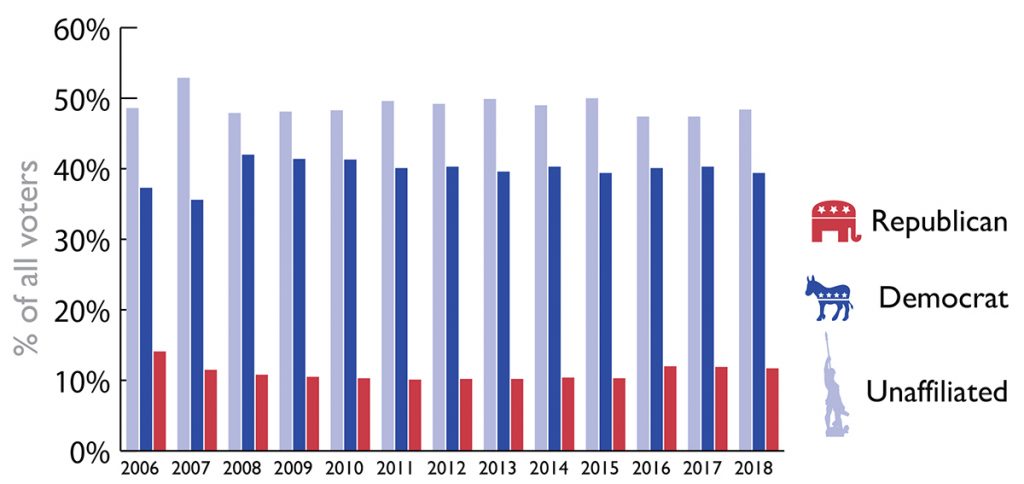
STRENGTH IN NUMBERS: Independents have been the largest group of registered voters in Rhode Island since at least 2006, when the state fully implemented its Central Voter Registration System. During that time, the total number of registered voters has ranged from a low of 666,300 in 2007 to a high of 770,200 in 2016. / SOURCE: R.I. OFFICE OF SECRETARY OF STATE[/caption]
GROWING NUMBERS
Political independents also are the largest group of voters in other states, including Massachusetts and Connecticut, but statistics vary by region. In Kentucky, Democrats and Republicans are about even and independents account for only 5 percent of voters. In California, registered Democrats are the largest group by far, followed by nearly equal numbers of Republicans and independents. In Kansas and South Dakota, registered Republicans are the largest group, according to the nonprofit Independent Voter Project.
Nationwide, the share of political independents reached its highest point in more than 75 years of public-opinion polling, outnumbering either Democrats or Republicans, the Pew Research Center reported, in 2016. Last year, Pew reported that divisions between Democrats and Republicans on fundamental political values, already widened during Barack Obama’s eight-year presidency, had grown even larger during President Trump’s first year in office.
“In nearly every domain,” Pew found, “views of Republicans and Republican-leaning independents and those of Democrats and Democratic-leaning independents are now further apart than in the past.”
It seems the political middle ground is shrinking, but not the number of independents. A Gallop poll last year affirmed Pew’s findings about the rising number of independents. Gallop found that 42 percent of Americans, on average, identified as independents, an increase from 39 percent in 2016.
Speakman traces disenchantment with the American two-party system and the seeds of today’s political independents back to 1968. After the assassinations of civil rights leader Martin Luther King Jr. and Democratic presidential candidate Robert Kennedy that year, violence broke out at the Democratic National Convention in Chicago when police and national guardsmen clashed with demonstrators.
There was a sense among some Democrats then, Speakman said, that the party had been hijacked and the protests were about “taking control back from the boys in the backroom” who seemed to be calling the shots, embodied by the nomination of Hubert Humphrey for president. Humphrey lost to Republican Richard Nixon that fall.
Today, some independents say that, despite rising party partisanship, they don’t see significant differences between Democratic and Republican candidates, raising more of a need in politics for alternative voices. Others say, with the emergence of progressives pulling the Democratic Party to the left and the Tea Party movement and President Trump pulling the Republican Party to the right, there’s a void in the middle for independents to step into, although not all fit into that category. Some independents have views that may be too conservative for Democrats, but similar to Trillo, they feel they won’t have a chance running as Republicans.
[caption id="attachment_230303" align="alignright" width="210"]
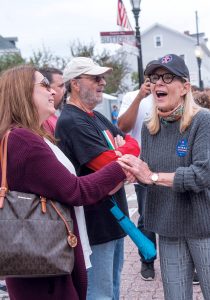
MEET AND GREET: Providence mayoral candidate Dianne Witman, right, shakes hands with Shelly Lariviere of West Warwick while greeting attendees during the Columbus Day Parade on Federal Hill.
/ PBN PHOTO/MICHAEL SALERNO[/caption]
POLITICALLY DIVERSE
Dianne “Dee Dee” Witman, one of two independents challenging Elorza in Providence, grew up in a politically diverse family. Her father supported Republicans and her mother supported Democrats. Her grandmother, she said, had a socialist bent, supporting the Workingmen’s Party. Founded in 1876, it was one of the first Marxist-influenced parties in the United States.
Witman, on the other hand, said she hasn’t been particularly attached to a party. She said she lent herself $500,000 for her mayoral campaign but plans to spend little of it. More than anything else, she did it to be taken seriously as a candidate.
She lives on Providence’s East Side, in a toney neighborhood north of Wayland Square. Through the years, she has been active in political fundraising and charity. After her husband, a physician who was paralyzed when a wave crashed over him at the beach, died earlier this year, she found herself as a senior citizen with the time to make her first bid for elected office.
“I have always voted for the person,” rather than the party, she explained. Being an independent “means I go for the person.”
“Everyone has become so polarized” in two-party politics, she added. If elected, “I would like to have a relationship with both sides.”
In that spirit, Witman held a campaign rally in late September in which the two Democratic candidates who Elorza defeated in the Sept. 12 primary election – Robert DeRobbio and Koby Dennis – came to support her.
Luis Vargas wasn’t born yet when Ross Perot ran for president as an independent in 1992, capturing 19 percent of the popular vote. The 25-year-old law student at Roger Williams University is running as an independent in another bid to oust longtime Democratic state Rep. Joseph Almeida to represent lower South Providence in the General Assembly. Vargas put up a strong challenge as an independent in the 2016 election, garnering 47 percent of the District 12 vote, compared with 53 percent for Almeida.
“I feel like both parties [Democrats and Republicans] have failed to represent the interests of my neighborhood,” Vargas said. “I feel the best time to help the community is when you’re young – when you have the most vigor to get your goals accomplished.”
Like Vargas, Daniel Elliott, a 37-year-old independent from Warwick, is taking a second shot at trying to beat Democratic incumbent state Rep. David Bennett in District 20. In 2016, Elliott received 42 percent of the vote, compared with 58 percent for Bennett. Despite having only $1,800 for his previous campaign, Elliott said he was able to make a strong showing against Bennett.
Elliott’s platform centers around cutting taxes for small businesses and making it easier for entrepreneurs to start their own businesses, rather than providing tax breaks and other forms of “corporate welfare” to big companies. He described himself as a “pro-business” and “pro-union” moderate, although he is concerned about public-employee unions exerting too much influence over government. He said Democrats in the General Assembly fall in line with the party agenda and end up catering to related special interests. He said he doesn’t identify with Democratic or Republican agendas.
“I think it’s important to represent the everyday working people of Warwick,” said Elliott, who runs his own lawn maintenance and landscaping company.
[caption id="attachment_230298" align="aligncenter" width="696"]

BREAKING AWAY: In an age of highly partisan national politics, many states, including Rhode Island, are seeing a majority of registered voters break away from the two-party system, choosing to be independents rather than register as Democrat or Republican. The Independent Man statue atop the Statehouse in Providence was never a more-appropriate representation of the Ocean State’s electorate, where independents outnumber Democrats and Republicans.
/ PBN PHOTO/PAM BHATIA[/caption]
Ewa Dzywierzynski, a pharmacist from Narragansett, is a disenchanted Democrat turned independent. She is seeking to unseat Democratic state Rep. Teresa Tanzi in District 34.
“I have traditional, moderate Democrat values,” Dzywierzynski said. “I have concerns that the progressive movement within the Democratic Party is taking the party in the wrong direction.”
In 2016, she ran unsuccessfully in a three-way Democratic primary for the District 34 seat. “As an independent” this time, she said, “I feel I can better focus on the issues that are important to voters while trying to move the Democratic Party’s center of gravity to be inclusive of all points of view.”
John Monk of South Kingstown has generally voted Republican through the years, but he decided to run as an independent this year for the General Assembly after Republican attempts on the federal level to change Social Security. Plus, as an independent, he knew he wouldn’t have to participate in the primary, instead going straight to the ballot for the general election.
“That number is surprising to me,” Monk said, when told that independent voters outnumber registered Democrats in Rhode Island. The former general manager for a unit of Pepperidge Farm is trying to unseat Democratic incumbent state Rep. Kathleen Fogarty to represent District 35, where, like numerous districts, there is no Republican challenger.
“We just keep voting in the same people, time after time,” Monk said. “That just rubs me the wrong way.” He’s also campaigning on his own money, which can be difficult, he admitted, but at least he feels independent. “I’m not obligated to anybody” by not having any contributors, he added. “I can march to the tune of my own drummer.”
Anne H. Armstrong is a true political outlier, running as an independent for governor because her party of choice – the Compassion Party – is not officially recognized in Rhode Island. She said she had a corporate job, then left to attend law school but didn’t finish.
Like most independents, Armstrong is campaigning on a shoestring budget. She reported having $355 for her campaign. as of Oct. 8.
Much of her platform centers around her Judeo-Christian beliefs and issues relating to the use of cannabis. She said the state should take steps to legalize cannabis and make it an integral part of Rhode Island’s economy – an example of what she calls “regenerative funding,” or a source of tax revenue that can be continually replenished.
Armstrong and Alan L. Gordon, a Compassion Party candidate for attorney general, were arrested Oct. 4 on drug charges. They were taken into custody on charges they were in possession of about 48 pounds of marijuana and contributing to the delinquency of a minor, after West Greenwich police and members of the state High Intensity Drug Trafficking Area task force executed a search warrant at the couple’s home on Hudson Pond Road.
[caption id="attachment_230297" align="aligncenter" width="696"]
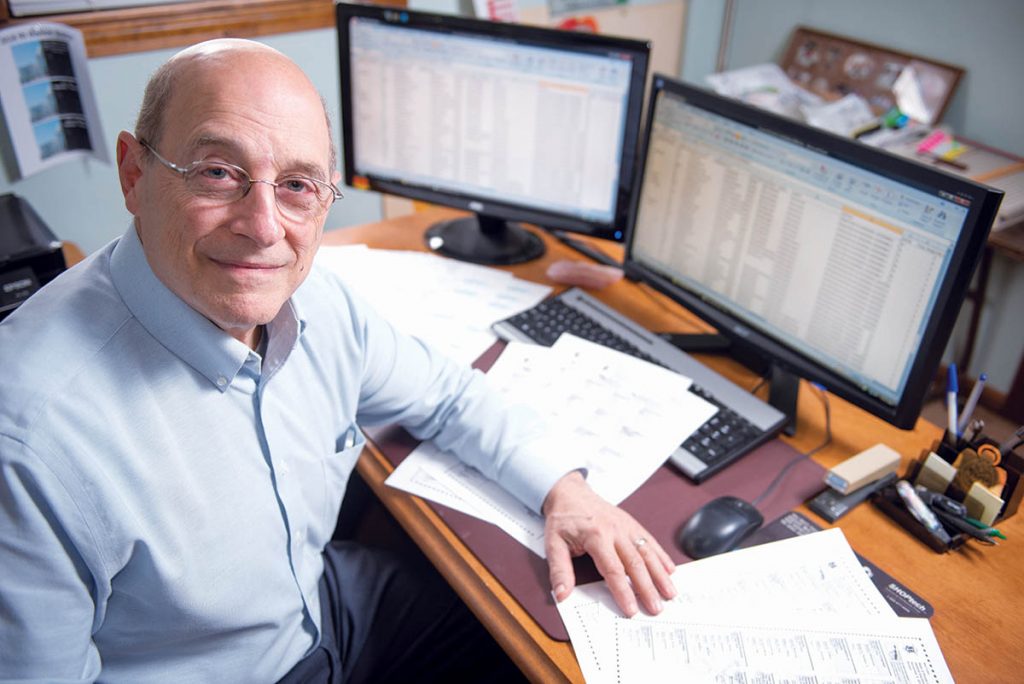
PBN PHOTO/DAVE HANSEN / MORE Choices: Sav Rebecchi started www.fullballotsRI.com to encourage more competition for elected offices in Rhode Island. After two failed campaigns as a Republican running for a seat on the Jamestown Town Council, Rebecchi ran again for the seat as an independent, as well as for the Jamestown School Committee and for state senator, all unsuccessfully.[/caption]
Sav Rebecchi turned independent after twice running unsuccessfully as a Republican for Town Council in Jamestown. After those runs, he took a break from politics for a few years. At cocktail parties, he found that he often was the only Republican in the room.
“Many of my friends were Democrats,” Rebecchi recalled. “I became the token Republican at social events.”
He emerged again on the Jamestown political scene as an independent, this time running for Town Council, the School Committee and finally for state senator – all unsuccessfully. No longer plugged into the Republican Party, he found it more difficult to raise campaign money. But he’d hoped he would have more luck at the polls as an independent, at least for local offices that don’t typically involve partisan politics.
When Rebecchi ran as an independent, it wasn’t because his political values had changed; it was because he thought it would make him more appealing to voters. He says the widening divide between Democrats and Republicans nationwide should not have much, if any, effect on Rhode Island’s independent candidates in the upcoming election. He thinks most independents still won’t stand much of a chance of getting elected.
“My feeling is based on the dominance of the Democrats,” he said.
“I think a lot of people became unaffiliated so they could walk into a primary [election polling place] and vote. And because people don’t want to be branded by either of the parties,” he said. “An independent who was a Democrat has more of a chance to get elected than an independent who was a Republican.”
But he has no regrets having run as an independent.
“As I liked to say: There’s no Democratic way or Republican way to fix a pothole,” he joked. “Being an independent didn’t make me more of a winner, but I could get along better with my friends. And I found the introductions at parties were far more cordial.”
Scott Blake is a PBN staff writer. Email him at Blake@PBN.com.


